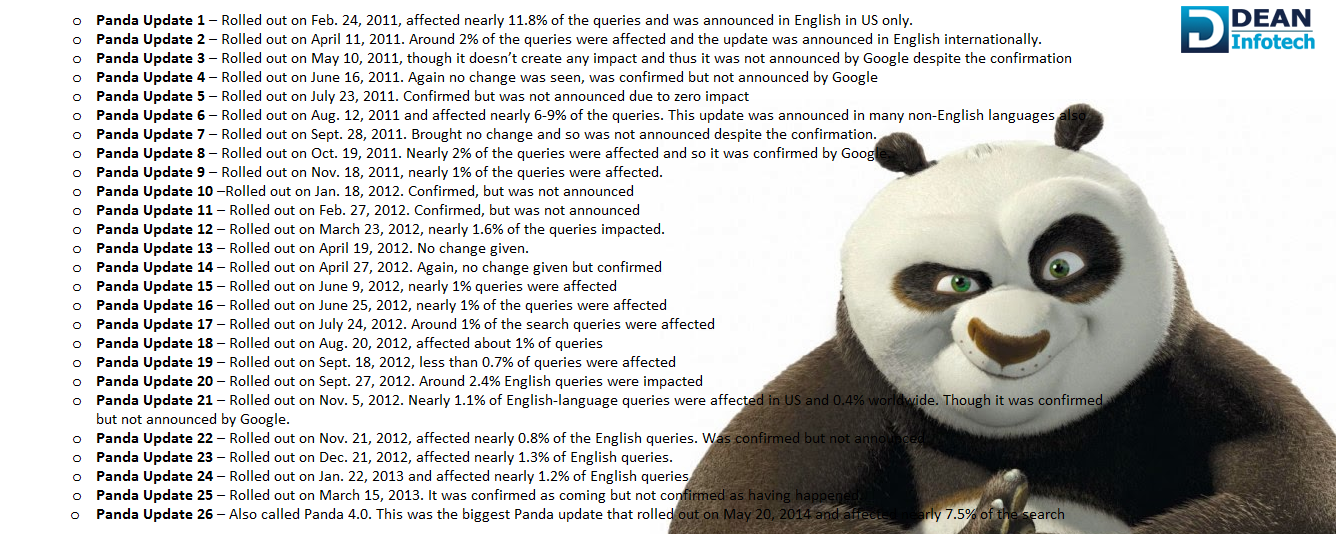Panda 4.1-Latest Algorithm update by Google
Google, the biggest search engine giant across the globe has already started rolling out the latest Panda Algorithmic Update – Panda 4.1- a filter that aims at penalizing poor or low quality content in an endeavour to restrict it from getting higher rankings in the search engine results. As per various sources, Google claimed that depending on the locations, nearly 3-5% of the search queries are going to be affected by this update shortly. Launched on September 25, 2014; Panda 4.1 will be a “slow rollout” expected to fluctuate rankings to a great extent.
WHY ARE WE CALLING IT PANDA 4.1?
Panda 4.1 is the 27th update introduced by Google ever since it launched its algorithmic update by the name of Panda. But, you might be wondering why this new update is introduced with the number 4.1 only. Well, this is because the earlier Panda update that launched in May 2014, just a few months ago was Panda 4.0 and that was a major update by Google. In fact, it affected close to 7.5% of the search queries, the biggest till now. And, since it is very difficult to remember random names, Google decided to number the updates sequentially, just like a nomenclature is used for naming upgraded versions of software. Good, isn't it?
How many Sites are going to be affected by this update?
The big Panda update 4.1 is expected to impact many websites across the web. Nearly 3-5% of the search queries are going to be touched down by the revised algorithm. As per various sources, some sites including yellow.com, exactarget.com, theepochtimes.com, healthcentral.com, office365.com and ehow.com etc have lost considerable amount of traffic(>60%) due to this update. In all, there are more than 100 websites revealed by Searchmetrics who’re seeing a significant loss in their organic SEO visibility making them big time losers. However, there are some websites that are benefitted by this update and have gained a lot of traffic. Some of the biggest lucky winners include hongkiat.com, babble.com, comdotgame.com, mediamass.net, hotelguides.com and yourtango.com.
So, how different is Panda 4.1 from the earlier Panda 4.0?
Yes, we all know that Panda 4.1 is just a continuation of the previous update Panda 4.0, which was released about 4 months ago in May 2014. But, most of you might be unaware about the fact that Google has completely re-written the Panda algorithm in its previous version- Panda 4.0 and this latest update (Panda 4.1) is just a refreshed version of the same algorithm to filter the thin content from the organic search rankings. One more interesting thing to know is that this newest update will be pulling out some websites from the grey zone (sites hit by the earlier Panda) who have taken serious steps and have corrected the issues with their websites.
List of Previous Panda Updates
Previously, 26 Panda Updates were introduced by Google before it announced Panda 4.1. Here I have compiled a complete list of all previous Panda Updates -
 |
| Previous Panda Update |
How to recover from the Panda Effect?
If you’re hit by Panda 4.1 & are seeing a huge traffic drop & low search engine rankings, you must take quick action to recover your website as soon as possible. Here I’m giving some instructions that you can follow to pull out your website from this Google Penalty.
1. Enhance the user experience of your website. This includes improving the navigation to make it easy enough for visitors & search engine crawlers to find relevant information fast. Remove the unnecessary clutter and create a user-friendly layout that pleases search engines as well.
2. Generate high quality content for your website. Hire professional writers and update all your website content. Also, keep posting relevant content in the form of blogs and make a content calendar to improve the content quality of your website
3. Integrate social media accounts and promote your content within the targeted audience. Allow people to comment, share, like and tweet on what you post by integrating social media icons like Facebook, Twitter, Instagram, Linkedin, Google+ etc.
4. Reduce the bounce rate of your website. Try to retain visitors for maximum time by engaging them wisely. Make sure people don't leave immediately when they land up on your website.
After you follow necessary actions, don’t forget to submit a reconsideration request to Google. Ideally, you should get a reply within 1-2 weeks from Google else submit the request again. If Google thinks your website is good enough, you’ll be able to rank even higher amongst your competitors on the search results.
After you follow necessary actions, don’t forget to submit a reconsideration request to Google. Ideally, you should get a reply within 1-2 weeks from Google else submit the request again. If Google thinks your website is good enough, you’ll be able to rank even higher amongst your competitors on the search results.
All Categories
Technology
635
Others
673
Internet & eBusiness
3776
Self Improvement
192
Book Reviews
42
Travel
850
Software
297
Health & Medical
2882
Career
167
Kids & Teens
20
Gaming
246
Education
431
Business
4847
Legal
149
Entertainment
223
Society & News
1412
Computers
352
Environment
49


